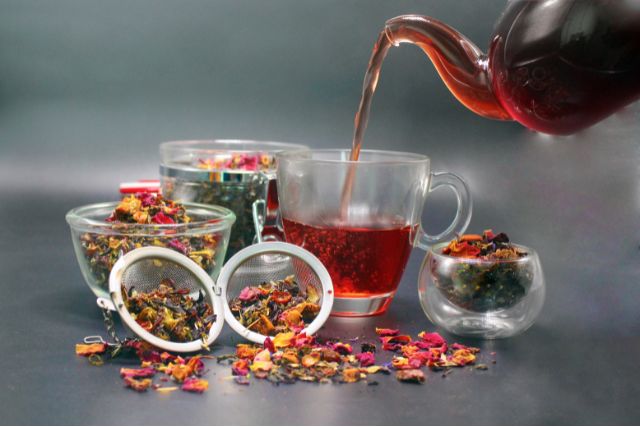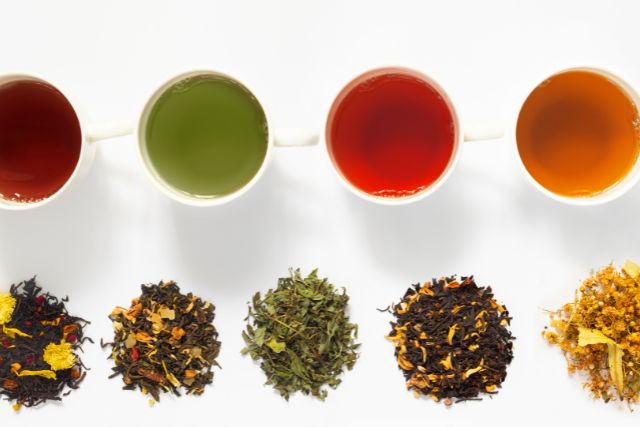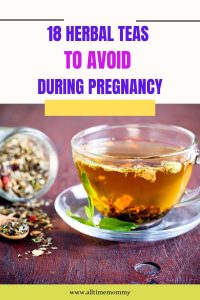Discover which teas to avoid during pregnancy to ensure a healthy and safe journey for you and your baby. Learn about potential risks associated with certain herbal teas and gain insights into making informed choices for a wholesome pregnancy experience.”
For many years, herbal teas have played a significant role in human life.
Traditionally, different herbs were used as natural preservatives or for medicinal purposes. Alternatively, these herbs would be ground and converted into capsules, powders, tinctures, or brewed as tea.
There is indisputable evidence of healing using natural herbs and herbal teas.
From enhancing fertility to curing infections, many communities cling to the use of herbs during pregnancy.
Today, I stand to testify that I have benefited health-wise through herbs. And maybe, that is why I like research associated with the healing power of herbs and spices.
But is every herbal tea safe for pregnancy?
Well, natural herbs possess reactive chemicals and compounds. As such, you must determine the correct quantity before administration.
But is it even possible to come up with the correct dosage at home?
Well,
While some herbs are safe for pregnant women, certain teas can cause miscarriage and should be avoided in high amounts.
I believe that most herbs are administered orally at home as concoctions without a prescription from a specialist. And there is a lack of comprehensive research that gives accurate dosage.
That is why you must take precautions about some herbs used to make pregnancy teas, lest they harm you or your fetus.
Here is the list of herbal teas to avoid during pregnancy. Please note that these teas may be harmful and you may need to avoid these teas in your first trimester.
Herbal Teas to Avoid During Pregnancy
1. Black Cohosh Tea and Herbal Extracts
Black cohosh is a member of the buttercup family, which I believe poses numerous health benefits for female reproductive health.
This herb has been used for years to control hot flashes in menopausal women. It is also used to regulate the menstruation cycle and ease menstrual cramps for fertility improvement.
However, research shows that black Cohosh may be unsafe to take during pregnancy, especially in your first trimester thus one of the herbal teas to avoid during pregnancy.
Studies suggest that this herb contains substances that may cause uterine contractions, thus inducing preterm labor.
Accordingly, some clinicians allege that Black Cohosh in high doses during pregnancy may cause cramping, headache, stomach upset, and vaginal spotting or bleeding.
For this reason, try as much as possible to regulate this herb’s usage after conceiving.
Related:13 Natural Remedies for Vaginal Dryness During Pregnancy and after Childbirth
2. Saw Palmetto Tea and Herbal Extracts
The saw palmetto is a dwarf palm tree found in North America. This herb enhances urinary function, hair growth and improves fertility-related issues.
However, some studies have linked saw palmetto to increasing the risk of birth defects in pregnant women.
According to a study, oral consumption of saw palmetto may pose a risk to unborn male fetuses. It is said to affect the normal development of male genitalia, thus increasing the risk of defects in babies.
Similarly, this herb has been associated with high hormonal interactivity in the body, a factor that may be risky during pregnancy.
For these reasons, the American Pregnancy Association discourages the use of saw palmetto in children, pregnant and breastfeeding mothers.
3. Goldenseal Tea and Herbal Extracts
Native Americans commonly use goldenseal as an antibiotic. For years people have used it to treat respiratory infections like tuberculosis, mouth ulcers, and diarrhoea.
Infact, one study shows that goldenseal was used to cure inflammation and infectious conditions in the past.
Today this herb is added to some over-the-counter health products like ear drops, allergy relief products, feminine hygiene products, and cold and flu remedies.
Although there’s little evidence on its effects on pregnancy, some studies suggest that some of the chemical compositions in this herb can be fetal to developing fetus.
Goldenseal contains isoquinoline alkaloids, hydrastine, and berberine. These active substances have been found to induce uterine contractions if taken in large doses.
One study on rats found that berberine administration caused lower weight in mothers and babies. Additionally, berberine has been shown to worsen jaundice in infants. It can also lead to kernicterus, brain damage that may be fatal.
Since it’s hard to ascertain the dangerous levels of this herb in pregnancy, it’s better to avoid it altogether until you’ve delivered.
4. Parsley Tea and Herbal Extracts
Parsley is widely known in the Mediterranean region. This herb is commonly used to add flavour to food.
It’s loaded with vitamins A and C, great for a healthy pregnancy and child development.
According to research, parsley contains antifungal and antibacterial activities that can protect your body against some infections. Also, it contains flavonoids, antioxidants that can protect your body from oxidative stress-related damages.
Additionally, myristicin and apiole compounds found in parsley may enhance estrogen production in menopausal women, thus reducing the severity of some of the negative symptoms of menopause.
But is it safe for use during pregnancy and breastfeeding?
No.
Studies show that the Myristicin and Apiole compounds in parsley make it unsafe for use during pregnancy.
These two compounds may cause uterine contractions and lead to miscarriage when consumed in high doses, especially in early pregnancy.
Similarly, there is a potential risk for heavy metal toxicity when consuming parsley, which makes it unsafe for pregnant and breastfeeding women.
5. Red Clover Teas and Herbal Extracts
Red clover is a flowering herb eaten as a legume and supplements to enhance female health.
According to naturalists, red clover herbs can boost fertility by enhancing blood circulation in the ovaries and uterus.
Similarly, besides being used to ease the severity of menopausal conditions like hot flashes, red clover has proved effective for people suffering from weak and brittle bones, breast pain, and baldness in men.
Some studies, however, suggest that Red clover contains isoflavones chemicals which, if taken for a long period, may cause muscle aches, nausea, and vaginal bleeding.
Similarly, they contain phytoestrogens, a chemical that mimics the functioning of estrogen in your body. This can alter hormonal activities during pregnancy, thus posing some risks to your health.
6. Dong Quai Tea and Herbal Extracts
Dong quai is popular Chinese medicine whose roots are used to treat menstrual cramps and several menopausal conditions.
Additionally, this herb, which belongs to the same botanical family as carrots and celery, is thought to replenish blood in women after menstruation, regulate the immune system and relieve pain.
Although effective for female reproductive health, taking Dong quai orally during pregnancy increases the risk of birth defects.
Some studies suggest Dong quai may stimulate the contraction in the uterus, leading to a miscarriage, especially in the first trimester.
Related: These 12 Anti-inflammatory Herbs Will Make Your Menstrual Cramps Go Away
7. Angelica Tea and Herb Extracts
Angelica, also known as Angelica archangelica, is a Chinese herb that grows up to 250 cm tall. The root, seed, leaf, and fruit of this herb have been used historically in Nordic folk medicine.
Angelica is alleged to contain chemicals that may enhance digestion issues, reduce anxiety, enhance your memory and reduce the frequency of urination at night.
Additionally, some studies show that angelica roots may reduce the severity of menopausal symptoms.
But,
Is Angelica tea safe during pregnancy?
Medics strongly discourage pregnant women from orally ingesting this herb. Despite its numerous health benefits, Angelica is thought to cause Uterine contractions, increasing the risk of miscarriage in early pregnancy.
8. Hibiscus Tea and Herbal Extracts
Hibiscus is a flowering plant that grows in the tropical climate. Traditionalists used various parts of this plant for different purposes.
Some parts of this herb were used to make ropes; others were used for medicinal purposes.
The herb contains antioxidants, and it is alleged that it could help reduce blood pressure and fight the bacterial infection.
But is hibiscus tea safe during pregnancy?
One study on rats found that consuming hibiscus regularly in pregnant rats leads to delayed puberty in offspring and causes maternal malnutrition.
Additionally, hibiscus is known to be an emmenagogue herb. This means regular consumption of hibiscus tea and herb extracts encourages blood flow to the uterus for menstruation stimulation.
The downside of this factor may include cramping, bleeding, and early labor that can lead to miscarriage.
9. Yohimbe Tea and Herb Extract
Yohimbe is a native tree from Africa. Its bark contains a medicinal value and is mainly used as a supplement for sexual arousal in women, erectile dysfunction and obesity.
Despite these numerous benefits, this herb should not be used during pregnancy.
It is alleged that Yohimbe increases the risk of high blood pressure and heart attacks in pregnant women.
Similarly, this herb has been associated with uterus stimulation, which can cause premature contraction leading to pre-birth or defects in the fetus.
Although the research on the allegations is limited, try to avoid using this herb or its pregnancy tea for your safety.
10. Feverfew Tea and Herbal Extracts
Feverfew plant, or febrifuge, as known in Latin, is a herb that is used to cure fevers, headaches, and toothache.
This herb contains flavonoids, parthenolide, and volatile oils as its active compounds. These compounds contain anti-inflammatory properties that can reduce inflammation and ease pain.
In fact, some studies suggest that feverfew was effective in reducing the intensity of migraine headaches. No, wander some people referred to it as “medieval aspirin” in the 18th century.
Is Feverfew safe during pregnancy?
No. Pregnant women are cautioned against taking this herb since it may cause uterine contractions and cause miscarriage.
11. Blue cohosh Tea and Herbal Extracts
Blue cohosh is a herb whose roots are used for medicinal purposes. Mostly it comes in the form of supplements and is used to relieve reproduction health-related issues in women.
Midwives use this herb to induce labor. Consequently, the herb can induce and start menstruation, reducing muscle cramps and helping with inflammation of the uterus.
Blue cohosh is thought to stimulate uterus contraction during pregnancy and thus may be unsafe to use, especially in the first trimester.
Some studies suggest that the chemical composition of this herb may also lead to birth defects.
12. Yarrow Tea and Herbal Extracts
Yarrow is a herb that is known to boost fertility in women. It’s used for menstrual cycle regulation and uterus toning for women trying to conceive.
Traditionally, this herb was used as an abortifacient and contraceptive. It could also cure diarrhoea, fever, hypotensive, common cold, and diuretic issues.
However, one should stop using it after ovulation or once you suspect that you might have conceived. This is because, as a uterus stimulant, Yarrow may cause uterus constriction, leading to could cause miscarriage.
13. Passion Flower Tea and Herbal Extracts
Passionflower is a herb that grows in warm areas. It’s dominant in the southern U.S., Mexico, and South America.
Traditionally this herb was used to treat sleep issues, inflammation problems, boils, earaches, and liver problems.
Today the herb is available in various stores as supplements or oil for various ailments.
Research suggests that oral consumption of Passionflower should be avoided during pregnancy. This herb is said to have the ability to stimulate the uterus and potentially induce labor.
Also, people expecting to undergo surgery should stop taking Passionflower at least two weeks before the procedure to lower the risk of complications.
Related: 10 Most Important Nutrients For a Wholesome Baby Development
14. Roman Chamomile Tea and Herbal Extracts
Chamomile tea is an oxidant and may promote healthy living. One study involving rats as specimens found that Roman chamomile extracts consist of antibacterial elements that could heal wounds.
However, pregnant women are advised to refrain from taking roman chamomile because it may cause contractions that might lead to preterm birth.
15. Mugwort Teas and Herb Extracts
Mugwort is widely known for its pain-relieving properties. In ancient days, soldiers used this herb to relieve foot pain after marching. Traditionally mugwort was used to induce delayed menstruation in women.
According to Chinese medicine men, the artemisinin chemical found in the leaves and roots of mugwort could trigger uterus contraction and promote regular menses.
Midwives could also use the herb to induce labor.
And as such, pregnant women are strongly discouraged from using this herb as it may cause uterus contractions and miscarriage in early pregnancy.
16. Aloe vera Herb Extract
Aloe vera is a succulent plant primarily found in tropical climates. For centuries, this plant has been known for its medicinal properties.
Researchers suggest that Aloe vera has anti-oxidant and anti-inflammatory properties to relieve certain skin conditions, like burns and wounds.
It also contains anthraquinone glycoside compounds known to relieve constipation.
However, medics warn that if ingested in large quantities during pregnancy, aloe plants could cause uterine contractions leading to miscarriage.
The research on this topic is limited, but you must take precautions, especially during the first trimester of your pregnancy.
17. Wild Yam Herb Extract and Root Teas
Traditionally, wild yam is used to enhance fertility in women. It optimizes estrogen levels and also enhances cervical mucus for easy conception.
However, if you suspect that you’ve conceived, you should stop the usage of this herb. This is because it can significantly throw your hormones off balance, thus affecting your pregnancy.
And not just pregnancy alone.
Due to potential hormone interactions, if you are suffering from endometriosis, uterine fibroid, or certain forms of cancer, you should avoid wild yam root products as it may worsen the situation.
18. Tansy Herb extracts and Teas
Tansy is a herb first discovered and used by ancient Greeks in the sixteenth century.
This plant was used to cure digestive tract issues like stomach ulcers, gallbladder conditions, nerve pain, fever, and joint pain. With its pleasant taste, tansy is used as a flavoring for puddings and omelets.
In medieval times, this herb was used by midwives in large doses to induce abortions. Ironically, smaller doses were thought to prevent miscarriage and enhance fertility.
Today some medicines contain tansy extracts as a treatment for colds and fever.
Medics, however, warn that using tansy during pregnancy may be unsafe. As an abortifacient herb, tansy can cause uterus contraction, bleeding, or cause miscarriages
Takeaway
Most pregnant women take herbal teas for relaxation and medicinal purposes. However, while most herbs offer desirable outcomes when administered correctly, some may be abused, leading to fatality.
To be safe, learn about herbal teas to avoid during pregnancy. Do research well before administration any herbal tea. If possible, try to consult with your professional health care provider about teas that causes miscarriage during pregnancy to help you avoid the misfortune.
DISCLAIMER The information contained in this post is for general information purposes only. I’m not a health practitioner and as such, this information should not be used as a substitute for consultation with your professional service provider.



